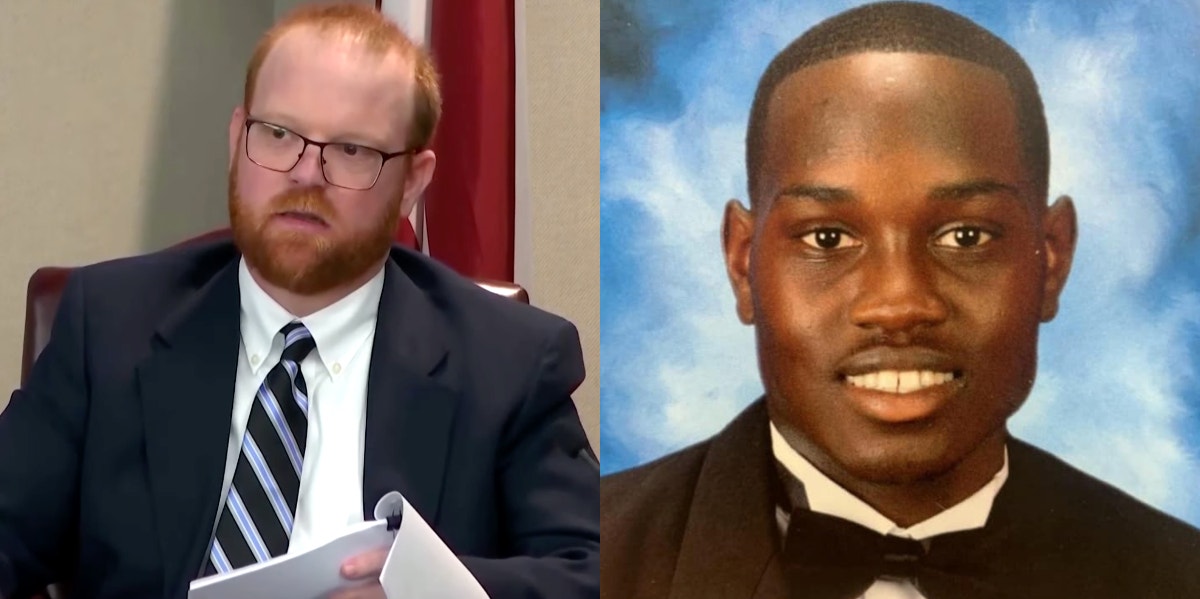Travis McMichael Admits Ahmaud Arbery Never Threatened Him After Calling Shooting A ‘Life Or Death’ Situation
This is not the first time he has gone back on his word.
 Youtube/Facebook
Youtube/Facebook Travis McMichael, who is currently on trial for the murder of Ahmaud Arbery has told a court that Arbery never threatened him.
The comments came during McMichael’s second day of testimony on Thursday November 18, 2021, where he appeared to contradict statements he made to his defense attorney the day before.
McMichael is one of three white men on trial for the murder of Arbery which took place in Feburary 2020,
On Wednesday, when McMichael took the stand he said, “He had my gun. He struck me. It was obvious that he was attacking me, that if he would've got the shotgun from me, then it was a life or death situation. And I'm gonna have to stop him from doing this, so I shot."
McMichael is the one who fired the fatal bullet that killed Arbery.
But his recollection of the so-called "life or death" encounter is rife with inconsistencies.
Travis McMichael's account of Ahmaud Arbery's death is unreliable.
As one of few surviving witnesses in the case, McMichael's version of events matters but with a story that has changed multiple times since Arbery's death, he is an unreliable narrator.
After claiming he engaged in some kind of physical altercation with Arbery, McMichael's story soon changed.
Travis McMicheal stated Ahmaud Arbery never threatened him.
McMichael recalled to prosecutor Linda Dunikoski on Thursday, “He did not threaten me verbally.”
Instead Arbery was “just running.”
McMichael acknowledged Arbery never responded or conversed with him in the moments prior to the murder.
Dunikowsi pointed out, “You know that no one has to talk to anyone they don’t want to talk to, right?” To which McMichael replied "yes."
McMichael shot Arbery at point blank range after following him for 4 minutes.
If this version of events is true, what McMichael is describing is a lynching — killing someone for an alleged offense without trial.
Under questioning McMichael claimed his training at the Coast Guard taught him de-escalation techniques — one of which included pulling a weapon.
"If you pull a weapon on someone, from what I've learned in my training, usually that caused people to back off or to realize what's happening" and comply with orders, McMichael said.
What McMichael doesn't explain is who this "deescalation" was meant to benefit.
Ahmaud Arbery, a Black man, was followed with a shotgun and fatally shot by McMichael in a predominantly white neighborhood.
For Black men, having a gun pointed at them is rarely a sign that a situation is about to deescalate.
For Arbery this truly was a life or death situation and waiting around to "comply with orders" was a risk to great to take.
There have been many inconsistencies in Travis McMichael’s account.
Later during the cross-examination McMichael admitted he could not remember if Arbery ever had hold of his gun, after telling his defense that Arbery had grabbed the weapon.
“It happened so fast and trying to recall everything, I've obviously missed every minute detail,” McMichael said.
McMichael initially did not tell police they were trying to make a citizen's arrest and, according to the prosecutor, there were differences on when and where he told Arbery to stop.
McMichael contended he was “scattered” and “mixed up” after what he calls the most traumatic event he has ever been through in life.
“I just killed a man, I had blood on me still,” McMichael said.
On Thursday, Dunikowski also stressed what McMichael chose not to do. She pressured him to why he ever raised the shotgun by saying, “you’re not letting him run away — you’re pointing the shotgun at him.”
"You could have driven behind (Arbery) and not spoken to him at all," and "you could have stayed in your truck" Dunikowski said.
Greg McMichael, Travis’s father, believed Arbery to be the person breaking into home in their neighborhood in Georgia after seeing Arbery on a property under construction.
However, security footage shows he was not the only person to enter the home. Travis grabbed his shotgun and went into his truck with his father to pursue Arbery who was jogging in broad daylight.
The third defendant William “Roddie” Bryan was seen in a black truck when Arbery was trapped between the two vehicles.
McMichael is the first to take the stand as the trial goes into its second week.
Sydney Taylor is a writer who focuses on News and Entertainment topics.
